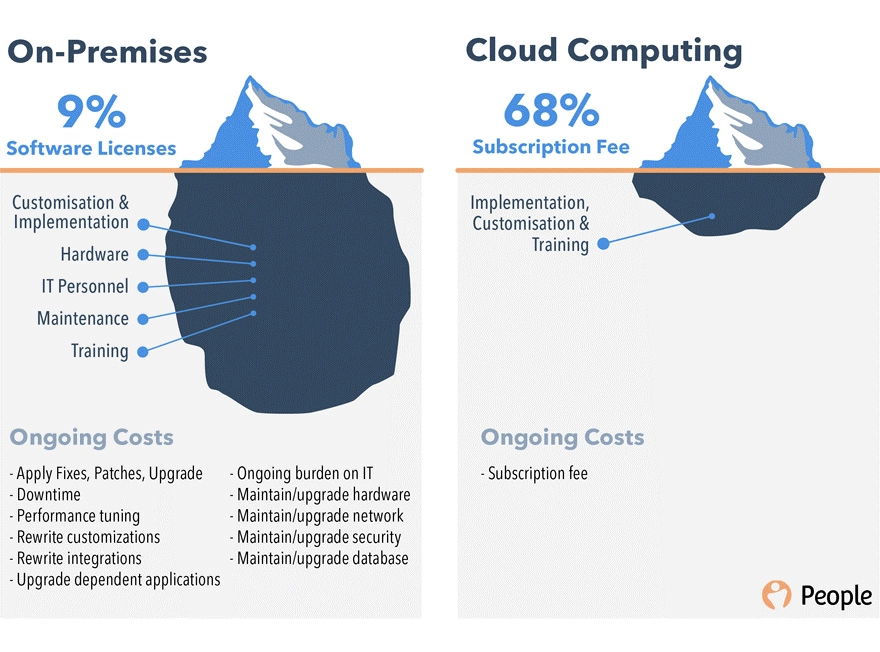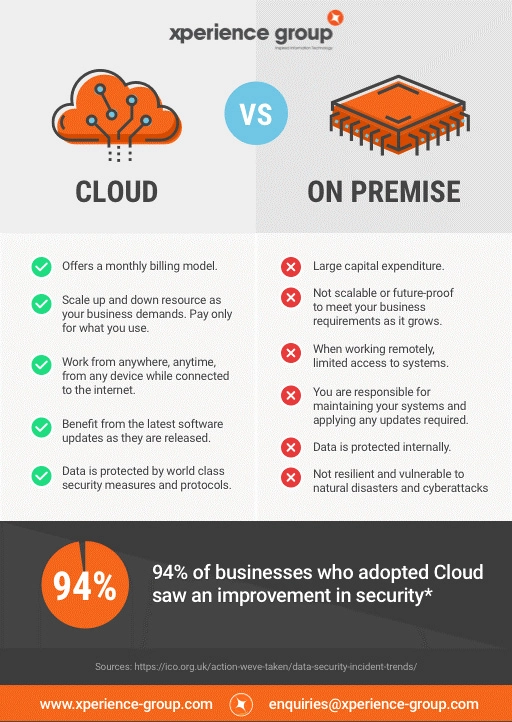
Introduction
It is a rational human inclination to exhaust all possible means of obtaining the best while spending less, Enterprise Resource Planning (ERP) hasn’t been any left out of this ideas.
This leads us to the two major (and only) categories ERP providers know, and those are Cloud Computing and On-Premise computing.
Cloud computing is a technique for storing large volumes of data and computer operational information on the internet and using such information to operate an entire organization’s computing system.
On the other hand, On-Premise computing is a rather primitive version of Cloud Computing as it focuses on storing Data and operational information on a local Company database. The software is installed on a personal computer or a general company hub and all other computers are connected to it.
Cloud Computing has an advantage of not needy of active management, directly by the user. However, despite the sophistication and ease of use, some factors could give On-Premise Computing an edge, which includes reliable security and retention of structure.
More important than the intrinsic pros and cons of these two systems of Enterprise Resource Planning is their salability.

Source: PeopleHR
How well can you convince a client to buy either of these services?
Well, here’s a try;
For Cloud Computing
The general trick is to overexpress the advantage of one system against the other, and the advantages of cloud computing are unlimited. They are:
1. Saves your clients’ money
As a hosting provider, you assume the duties of an IT manager, thereby reducing the bulk of wages required in that department, but more importantly, a cloud computing system will allow your client pay only for services they use. This means; they wouldn’t have to buy hardware and software upgrades by themselves for subsequent the years.
2. Access to IT exclusive services
Beyond wage cut, such companies also are eligible to an uninterrupted IT support, even at off-work hours on weekends (when most unanticipated emergencies occur). This could be a good selling point if you can convince your client of your rather specialized staffing compared to the company’s IT guys.
3. Infinite data storage
Especially if your client deals with large volumes of data, it could be helpful to your offer to cite the capacity of cloud storage as being able to take it all.
4. Save on office space
For startups that are into the mortgage system or using a coworking space, you may further save on renting an extra office space for your servers. Keeping your client abreast of this equally heightens their interest in cloud computing over on-premise computing.
5. Security
As a cloud vendor, you take full responsibility of the client’s data security, and in fact, the client has the advantage of verifying your data security by the efforts of a third-party security expert. To cite this advantage, you must be careful about your client’s interest. Does your client need a system that saves money or secures data? If reducing cost seem more important, pitching this advantage could be perceived as an extra cost, which will be deterrent.

Source: Xperiencegroup
For On-Premise Computing:
While cloud computing may be easily sold to small startups, On-Premise Computing is easier to sell to large companies. You may freely site merits, such as:
1. Total Control
Cloud solutions do take less time to implement and it’s handled by a vendor. On-Premise computing, on the other hand, sits fully in the hands of the company. Again, there’s got to be some form of preemptive studying of your client to know whether or not they are rather DIY inclined since non-DIY clients would be less interested in this fact.
2. Its Version of Security
On-Premise Computing, depending on the nature of the company you are pitching sales to, could appear to have a security advantage over cloud computing. Government-related and bank-related companies have sensitive data, so much that if a certain level of security or privacy is not attained, the company considers itself as nonoperational. As saleable as this factor is under the above-stated circumstances, it will make almost no sense to clients like say; a startup on a premises lease. This means as a vendor you will need to categorize your selling points. However, to express your adeptness in the field and a need for client-specific customization, it’s logical to cite a disadvantage to a client which actually would be an advantage for another client.
3. The Compliance Issue
Having a vendor handle your data could be risky for industries related to health or educational fields. This is because they are bound by regulatory acts such as the Health Insurance Portability and Accountability Act (HIPAA) or the Family Educational Rights and Privacy Act (FERPA). Also, they contain sensitive information such as patients’ and students’ data. If your client or target company is answerable to such acts, then On-Premise Computing would be the best for them, where they will be assured of the state of their servers at all times.
How to Get the Best of Both Worlds?
On-Premise and Cloud Computing may have their respective merits and demerits, but oftentimes we see Companies that want to harness the advantages of both hence the development of Hybrid Computing.
What Is Hybrid Computing?
Just as the name implies, it is simply a mix of Cloud and On-Premise Computing where your client selects data to be kept on cloud and information that are better kept locally. Apart from having a benefit of both systems, hybrid computing also avoids the full impact of the disadvantage of either system. The foresight of a potential disadvantage could easily prompt your client to opt for the alternative storage system and continue operating accordingly.
Final Thoughts
As it has been expressed above, there’s no single best way to store data, therefore it becomes a vendor’s responsibility to analyze the most appropriate system for the client of interest while considering security, cost, compliance, ease of use and several other factors as related to specific companies and industries. However, it would seem the hybrid system is most reassuring since easy manipulations can be made for the best fit.
Our blog
Latest blog posts
Tool and strategies modern teams need to help their companies grow.

Our definition of marketing success in B2B is evolving. For years, traditional metric...

Video has emerged as one of the most effective tools to cut through the noise and con...

The way B2B buyers research, engage, and decide has changed and so must the way marke...







